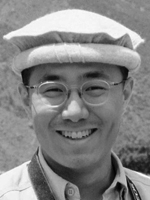Yee Lak Elliot Lee

Areas of Interest
- Islam in China
- Historical anthropology of Chinese religions
- Sociological theories of religion
- Secularity beyond the modern West
Chinese Muslim secularity with a regional focus on the Pearl River Delta
In order to reconstruct the specific distinctions and differentiations used in the identity politics of Chinese Muslims, my previous studies consist of a general survey of the internal identifications of Chinese Muslims – signified as Hui – by the larger Chinese society and the “Hui” elites covering the late imperial and post-imperial periods. By focusing on the meaning of “Hui” delineated in the Han kitab writings – Chinese Islamic writings written in Confucian terminology by Muslim literati – I argue that the late imperial Muslim elites constructed the legitimacy of their identity following a ‘religious’ logic and aligned themselves with Confucianism, at the same time, distinguished themselves from other Chinese in respect of their Islamic piety and spirituality. By contrast, the Muslim elites during the final days of the Qing dynasty and throughout the Republican era relied heavily on the distinction between religion and non-religious social spheres, as well as the secular concept of ethnicity to construct a “Hui” identity that could fit into nation-state identity politics.
Nonetheless, analysis of Muslim elite and state discourses may be too literary, elitist, schematic, and perhaps out of local social context. Therefore, I would like to redirect my focus to how Chinese Muslim networks in the Pearl River Delta of South China, especially between the metropolitan hub cities of Guangzhou and its outport, Hong Kong, subjected to, incorporated, and developed forms of distinction and differentiation that can be recognized as secularities in the wave of global industrial capitalism. Being the only port opened to Europeans from the mid-18th century to mid-19th century, Guangzhou’s reception of knowledge and information about the developments in the West stimulated the emergence of some indigenous Chinese theories on religious pluralism and secularism. Furthermore, since the British occupation of Hong Kong in 1840s, cross-cultural and political communication became more frequent. These vibrant exchanges of ideas fed into many political movements in China, which eventually had profound implications for Chinese society. By focusing on the development since mid-19th century, I would like to go beyond the artificial demarcation of two eras – late and post-imperial – in my previous studies and attend to the more local changes and continuities among Muslims by exploring local publications, journals, historiography, and institutional reports. Special attention will be paid to the development of Islamic institutions, especially (charity) foundations, in the region. By doing so, I wish to get into the emic ways in which Muslims organized themselves in reaction to socio-political changes informed by the reified category of religion, etic knowledge about Islam, and the development of other social spheres/groups, which were brought forth by the spread of industrial capitalism in the region.
Furthermore, the Pearl River Delta may serve as an anthropological field site for the study of contemporary Muslim secularity and religiosity in the region. The region has witnessed and continues to witness an influx of Muslims from around China and the globe since the Reform and Opening Up Policy of China in 1978. Different Islamic traditions are brought into the region, which allows research to be done on the operation of sharia, as a form of minjian/unofficial law, in conjunction with the official state regulation of religion and ethnic customs in Guangzhou and the government’s laissez-faire attitude towards religion in Hong Kong inherited from the city’s colonial past. This provides a heterogenous political and social context for the imposition, negotiation, creation of, and resistance towards secularity within the Muslim networks in the region. Testing the “multiple secularities” approach in such a context would allow the expansion of the approach beyond a fixated binary of Western vis-à-vis non-Western contexts.
Biography
Honorary Research Assistant, Centre for the Study of Islamic Culture, Research Institute for the Humanities, Chinese University of Hong Kong, Hong Kong (China)
M.Phil., Religious Studies, Chinese University of Hong Kong, Hong Kong
Research Assistant, “Buddhist Gentrification in Shanghai Project” funded by Direct Grant for Research and Research Grant, Chiang Ching-Kuo Foundation, Department of Cultural and Religious Studies, Chinese University of Hong Kong, Hong Kong
Relevant Publications
- Lee, Yee L. E. “Muslims as ‘Hui’ in Late Imperial and Republican China: A Historical Reconsideration of Social Differentiation and Identity Construction.” In “Islamicate Secularities in Past and Present.” Edited by Markus Dressler, Armando Salvatore and Monika Wohlrab-Sahr. Special issue, Historical Social Research 44, no. 3 (2019): 226–63.
- Lee, Yee L. E. “Behaviorist Fundamentalism Turns Radical: ETIM/TIP’s Islamic Fundamentalist Representations and Narratives.” Journal of Middle Eastern and Islamic Studies (in Asia) 9, no. 4 (2015): 85–99.


